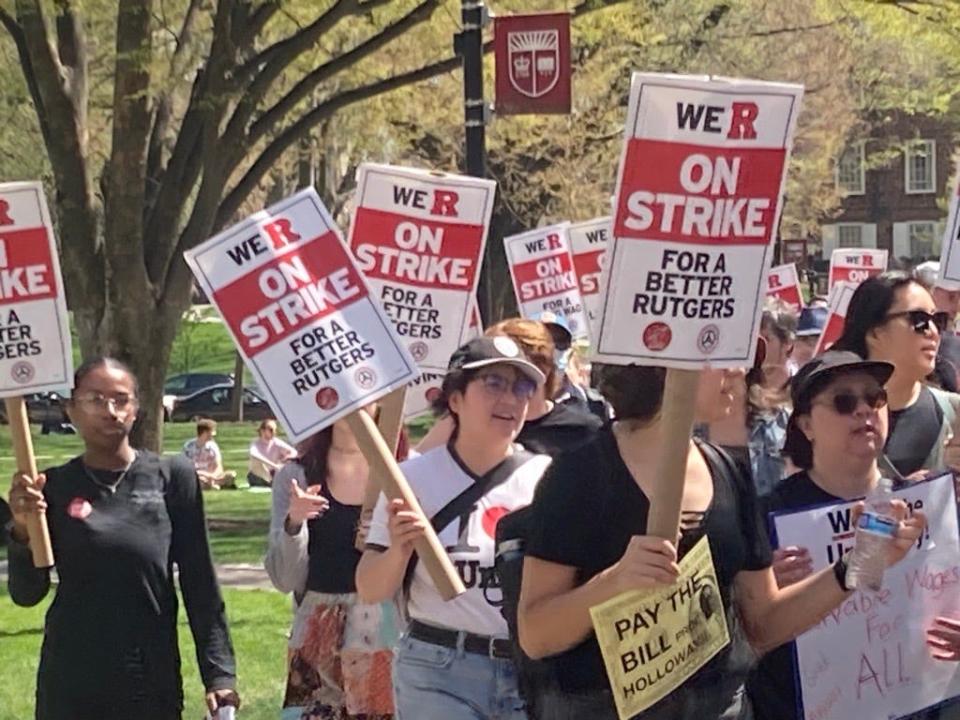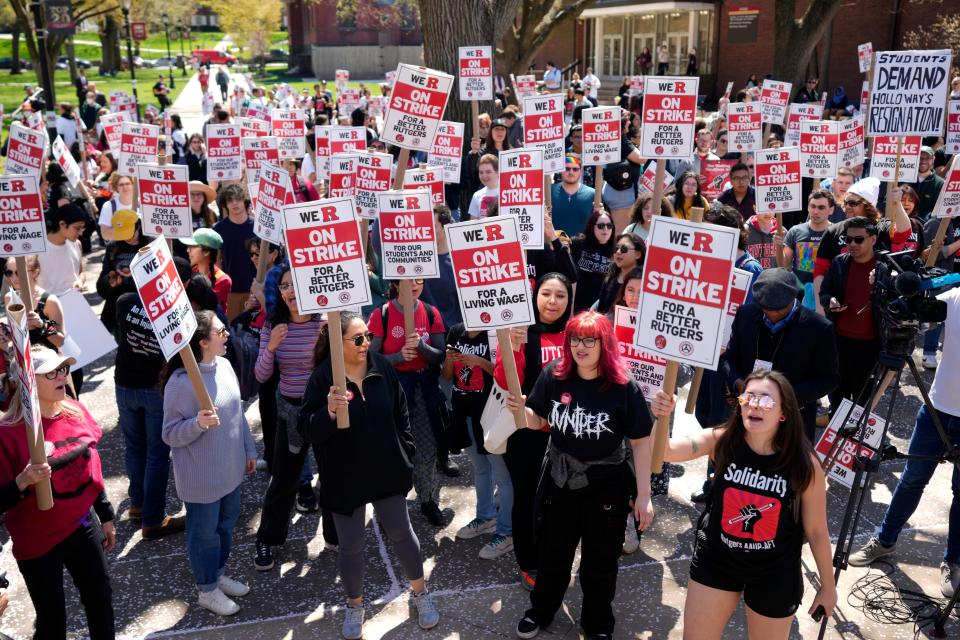Striking Rutgers unions 'guardedly optimistic' about reaching deal as Murphy steps in
- Oops!Something went wrong.Please try again later.
Rutgers University faculty union leaders said on Wednesday that they were "guardedly optimistic" to reach a new contract deal after their strike entered a third day and negotiations continued in Gov. Phil Murphy's offices in Trenton, but they did not specify a timeline.
The faculty strike is the first in the state university's 257-year history to shut down most classes at Rutgers' three New Jersey campuses.
"I am guardedly optimistic," Bryan Sacks, vice president of the Adjunct Faculty Union and an adjunct in the philosophy department at Rutgers-Camden, told NorthJersey.com. But "the greatest difficulty was simply the volume" of issues on the table, he said.
Both economic and non-economic proposals were being discussed, and the governor's staff was helping "categorize them and break them down," he said.

Additional funding from the state budget to help Rutgers reach a deal was also on the table, Murphy said Tuesday. He could not provide details because the discussions were ongoing, he said. "We are not just there in person, in a convening capacity, but in a meaningful, substantive way, I'll leave it at that," he said Tuesday night on the radio show "Ask Governor Murphy," produced by WNYC.
Murphy's involvement key
“These are tough issues, and it’s exhausting work, but we’ve made more progress in these two days than we have in many months,” said Rutgers AAUP-AFT President Rebecca Givan, crediting Murphy's "influence in overcoming the resistance of the administration" to core demands.
"I think the move to Trenton has given the negotiations a new focus and urgency," Sacks told NorthJersey.com, and noted that the energy on the ground at campus picket lines was motivating the union members in Trenton to keep at it and arrive at a "transformative" contract. "The dialogue has been quite productive since we arrived in Trenton," he said.
Murphy's intervention is a "game changer," said Howie Swerdloff, secretary of the Adjunct Faculty Union, after 10 months of negotiations between Rutgers and three unions representing faculty and graduate workers dragged on and ended in an impasse.
Some progress was made in the last few weeks before the strike was declared Sunday night, according to union leaders, but they had said the university was not taking their core demands "seriously."
Stile: The Rutgers strike has Phil Murphy 'pissed off.' This is the squeeze he's in
What the unions want
Those core demands address increased wages and job security for adjunct professors who currently have to renew their contracts every semester, irrespective of how long they have worked for the university.
The unions also want higher salaries for graduate student workers from $30,000 annually to $37,000.

These demands are equity-driven for the lowest-paid faculty, say union members, and entail systemic changes to how the university approaches hiring them.
The demand for longer contracts for adjunct faculty has a national significance for American higher education institutions, say union members, because this could signal changes in a hiring trend that has focused on cheaper and contingent labor over higher-paid full-time and tenured faculty.
Fourth union weighing whether to strike
Murphy is under additional pressure to help the two sides strike a deal after a fourth union — the Union of Rutgers Administrators (URA-AFT), which represents staff who work in dining halls, registrars offices and student housing — voted Monday to gauge their members' interest in joining the strike. The three faculty unions have welcomed the URA's support.
A strike by university staff would affect student services and could bring the campus to a screeching halt.
It was clear Tuesday night that even Murphy did not think a solution was imminent. "I am an eternal optimist," he told listeners responding to a question on WNYC's "Ask Governor Murphy," but he said talks would go "deep into the night."
He said he was "frustrated" that things got to the point of a strike, and said he did not want to discuss "individual personalities" in response to a listener's question asking what he would do if faculty members held a vote of no-confidence against Rutgers University President Jonathan Holloway. He said he was not happy about the strike, and praised Holloway's other achievements as Rutgers president.
"A post-mortem" was owed, he said, but the discussions were moved to Trenton. His team "put people in a room and you're not leaving until you get a deal," he said.
"Rutgers is a hot institution on all of its campuses and when you look at a progress that's been made...President Holloway deserves a lot of credit for that," Murphy said.
Holloway threat of legal action
Holloway has been criticized by union members for threatening legal action to halt the strike.
Before the strike was announced academicians from across the country wrote Holloway an open letter asking him not to pursue a court ordered stop to the strike. Holloway told Rutgers students and faculty in Monday's email that he was delaying legal action to stop the strike at Murphy's personal request.
On Tuesday afternoon, groups of picketers, many of them students, marched in circles and chanted protests on the green in the Voorhees Mall area of the New Brunswick campus on College Avenue. The mood was upbeat and relaxed with people bringing their dogs and beating empty water containers as makeshift drums. People set up under a tent on the sidewalk that had pizza and water.
In an online message to students, Rutgers said that “many classes will continue to meet during the strike. We want students to continue to attend classes and to complete their academic assignments.”
It directs them to whatever learning management system their class uses or to consult with their instructor for information related to their specific classes.
Some professors are continuing to teach and are not participating in the strike, but union representative Alan Maas said it was not easy to estimate how many are not striking.
This article originally appeared on NorthJersey.com: Rutgers strike: Unions optimistic as Phil Murphy intervenes

